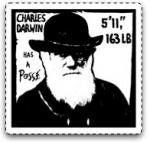
Adding to the recent celebrations of the sesquicentennial anniversary of the publication of Charles Darwin's On the Origin of Species on November 24, 1859, were three members of NCSE, writing for their local newspapers.
Mark Farmer, writing in the Athens Banner-Herald (November 24, 2009), compared Darwin to Copernicus, concluding, "Rather than challenging mankind's place in the universe, these two ideas liberate and enable us to move on to an ever greater understanding of the universe and our place in it. Through our genes we are connected to every living thing. Through our chemistry we are connected to the Earth. Through our very atoms we are connected to the stars and the universe. Big ideas indeed, and ones that challenge us to consider our place in the cosmos. These are ideas that should be embraced, not rejected. Ideas that should fill us with wonder and joy, not fear." Professor of Cellular Biology at the University of Georgia, Farmer also serves on the media advisory panel of Georgia Citizens for Integrity in Science Education.
Richard Firenze, writing in the Binghamton Press and Sun-Bulletin (November 24, 2009), discussed the theological impact of the Origin, which he described as arguably "the most influential non-fiction work ever written in the English language." He explained, "What Darwin offered, much to the chagrin of many, was a way to explain this apparent design without a designer. It should be noted that Darwin did not say there was no designer, only that one was not necessary to scientifically explain life's complexity." Lamenting the "controversy that distracts from our collective appreciation of the splendor of the mysteries of our natural world that so inspired Darwin throughout his life," Firenze urged that "we ... put aside our differences and make this a day of celebration." A recipient of NCSE's Friend of Darwin award, Firenze is Professor of Biology at Broome Community College.
Steven Schafersman, posting on the Houston Chronicle's Evo.Sphere blog (November 24, 2009), reviewed the scientific reception of the Origin. "Darwin's book presented evidence that the diversity of life arose through a branching pattern of evolution across millions of years of time, and that all living organism[s], including humans, were the product of this long history of genetic and morphological change," and the scientific community was swiftly convinced. Darwin's proposed mechanism for evolution, natural selection, was not as fortunate, of course, but today "Darwin's concept of evolutionary adaptation through natural selection became central to modern evolutionary theory and is now the unifying concept of the life sciences." A recipient of NCSE's Friend of Darwin award, Schafersman is president of Texas Citizens for Science.
If you're a member of NCSE and you celebrated Origin Day — by writing a newspaper column, holding a party, or just rereading the Origin — let the NCSE office know! And if you're not a member of NCSE, you can fix that — by joining today.
